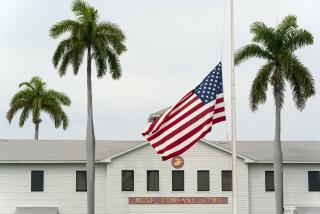In a Policy Vacuum, Rage Comes to a Boil
- Share via
The gangland-style slaying of four American oil company employees in Karachi on Wednesday has been simplistically characterized as retribution for the life sentence handed down this week to Mir Aimal Kasi, the Pakistani who was convicted of murdering three CIA employees outside the agency’s Langley, Va., headquarters in 1993. While the two events may indeed be related, they are more symptomatic of the twin failures in Washington and Islamabad to develop coherent post-Cold War foreign and domestic policies.
Most South Asia observers agree that the advent of nuclear proliferation, drug trafficking, arms trading and the rise of ethnic violence coincided with America’s pullout from Pakistan after defeating the Soviets in Afghanistan in 1989. Three million Afghan refugees replaced the CIA’s Pakistan brigade--the agency’s largest overseas operation at the time--bringing with them heroin addiction, Kalashnikov rifles and a deep-seated hatred for America for abandoning their cause.
Similarly, few observers of events in Pakistan contest the complete failure of government after government in Islamabad to provide the comprehensive economic infrastructure necessary to improve the lives of ordinary Pakistanis--improvement that might have directly reduced ethnic hatred and violence, as well as mitigating anger toward America as the root cause of all that ailed them.
The powerful symbolism underlying the twin slayings is equally central to understanding the two events. The CIA, to ordinary Pakistanis, is the symbol of America’s power run amok, the icon of those responsible for shredding the fabric of their country with Cold War shrapnel. Killing its employees at headquarters could be viewed as exacting symbolic punitive damages.
Similarly, killing American oil employees could be viewed as a strike at the symbol of America’s new incursion into the region, this time to pursue oil and gas in Central Asia’s emerging “Great Game” (history’s label for the 19th century European struggle over the region). American owned and operated pipelines and refineries to export and process Kazakhstan’s oil and Turkmenistan’s gas would have been ideal targets for anti-American terrorism had they been built by now. Oil company employees apparently were suitable stand-ins.
Symbolism aside, the failure of U.S. foreign policy in Pakistan is rooted in a complex mix of betrayal and hypocrisy: Islamabad’s being sanctioned in 1990 after its unflinching support of Washington during the Afghanistan war, and Washington’s encouraging, supplying and developing Pakistan’s nuclear program, only to turn around and cite the “Islamic bomb” it had produced as the reason for the 1990 military and economic embargo.
To complete the humiliation, Washington accepted payments for 28 F-16 jets it had agreed to sell Pakistan before the war’s end, then kept the money and the planes under terms of the 1990 sanctions. While it is currently under review, the handling of the sanctions matter was not exactly behavior expected from a staunch ally.
But perhaps the greatest failure when analyzing what went wrong in Karachi and Langley lies with Pakistan’s morally bankrupt political leadership. Since the end of martial law rule in 1989, jockeying among the feudal elite for power, money and the easiest ways to compromise Pakistan’s institutions of democracy has left precious little time or resources to develop an economy that should, and in fact at one time did, outpace Southeast Asia’s most successful “tigers.”
The key consequence of Pakistan’s perpetually stagnant economy has been the rise of lawlessness and disorder, again, fostered by politicians more worried about themselves than the citizenry. Even more disheartening: While U.S. economic sanctions impinged deeply on growth from 1990 to 1995, the primary drag was felt from ever-increasing Pakistani military budgets--money spent on war machinery to protect people more likely to die of starvation and disease than from some unimaginable nuclear holocaust.
If the Langley and Karachi murders teach us anything, it is that only through broad-based economic prosperity can diverse peoples develop sufficient stability to openly debate and settle their differences of opinion without killing each other. Pakistan’s political players must accept responsibility for their failed leadership and get on with building a 21st century economy. America must accept responsibility for its failed friendship and go back to Pakistan, moneybags in hand, and help. Perhaps then we won’t have to explain another murder in Karachi.
More to Read
Sign up for Essential California
The most important California stories and recommendations in your inbox every morning.
You may occasionally receive promotional content from the Los Angeles Times.













